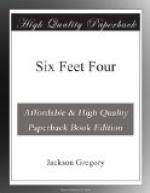“She’s Henry Pollard’s niece, Mary,” Smith said rather hurriedly. The girl glanced at him sharply. There was something in his tone which told her that he was warning his wife, cautioning her to speak guardedly of Pollard or not at all.
When, an hour later, she went to bed, she lay long sleepless, wondering, nervously dreading the morrow. For these people who should know gave Hill’s Corners the same name that Mr. Templeton had given it, the same name it bore as far as Crystal City and beyond. It was one of those far removed towns which are the last stand of the lawless, the ultimate breastwork before the final ditch into which in his hour the gunfighter has finally gone down. Desperate characters, men wanted in two states and perhaps in many more, flocked here where they found the one chance to live out their riotous lives riotously. Here they could “straddle” the line, and when wanted upon one side slip to the other. And hereabouts, for very many miles in all directions, the big cattle men, the small ranchers, the “little fellows,” all slept “with their eyes open and their gunlocks oiled.”
But, she tried to tell herself, Henry Pollard had sent for her, he was her own mother’s brother, he would not have had her come here if it were not safe. He had written clearly enough, had told her in his letter that he could not leave the Corners, that he must have the money, that there were hold-up men in the country who would not hesitate to rob the stage if they learned that he had five thousand dollars in it, that she could bring the bills which Templeton would have ready for her and that there would be no suspicion, no danger for her. And she would believe her uncle, would believe that these people had had trouble with the Bedloes and perhaps others in the town, and that they warped the truth in the telling. For was any more faith to be put in the word of the Smiths than in that of Buck Thornton himself? And did she not know him for what he was, a man who was not above assaulting a defenceless girl, not above robbery?
Wearied out, she went to sleep, her last waking thoughts trailing off through the night after a man who could laugh like a boy, whose eyes could grow very gentle or very, very hard and inexorable.
In the morning John Smith’s first words to her drove again a hot, angry flush into her face. For he told her that Thornton, before he would ride away last night, had made sure that Smith would accompany her, showing her the way and “taking care of her.” She bit her lip and turned away. She was grateful that soon breakfast was eaten, the horses saddled and once more she was riding out toward the south-east. Smith rode at her elbow.
All morning they rode slowly, over rough trails in the mountains where a horse found scant foothold, where they wound down into deep, close walled canyons where the sunlight was dim at noon, where the pines stood tall and straight in thick ranks untouched by an ax. They came out into little valleys, past a half dozen ranch houses, saw many herds of cattle and horses, crossed Indian Gully, topped another steep ridge and at last looked down upon the Poison Hole ranch.




